高中英语必修一1-5单元语法辅导资料
高一英语必修一1 5单元知识点

高一英语必修一1 5单元知识点高一英语必修一1-5单元知识点高一英语必修一1-5单元知识点unit1friendship1.begoodto对……亲善begoodfor对……有益;bebadto…/bebadfor…2.addup加起来增加addupto合计,总计add…to把……加到……3.not…until/till 意思是“直到…才”4.getsth/sbdone并使……顺利完成/并使某人被……5.calmdown平静下来6.beconcernedabout关心关注7.当while,when,before,after等鼓励的时间状语从句中的主语与主句的主语一致时,可以将从句中的主语和be动词省却。
whilewalkingthedog,youwerecarelessanditgotloose.8.cheatintheexam考试作弊9.gothrough经历;度过;获准,通过10.hideaway躲藏;隐藏11.setdown写下,记下12.iwonderif…..我不晓得是不是….12.onpurpose故意13.sthhappentosb某人发生某事sbhappentodosth某人碰巧做某事itsohappenedthat……正巧碰巧14.itisthefirst(second…)that…(从句谓语动词用现在顺利完成时)15.inone’spower处在……的掌控之中16.it’snopleasuredoing….搞…..没快感it’snogood/usedoingsth.搞某事就是没有好处/不行的17.shefounditdifficulttosettleandcalmdowninthehidingplace.it做形式宾语18.sufferfrom患…病;遭遇19.so…that…/such…thay…20.gettiredof….对…感到劳累疲惫21.havesometroublewithsb/sth.在……上碰到了麻烦22.getalongwithsb/sth.与某人相处23.ask(sb)foradvice.(向某人)征询建议24.make后接复合宾语,宾语补足语须用不带to的不定式、形容词、过去分词、名词等。
高中英语必修一第1-5单元单词和短语用法
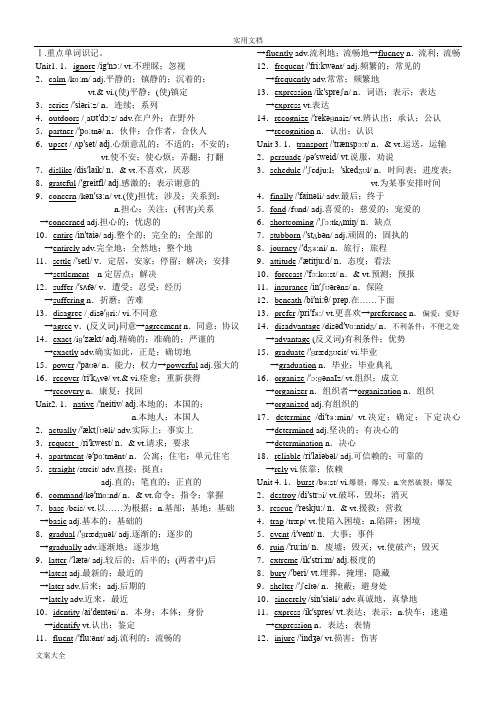
Ⅰ.重点单词识记。
Unit1. 1.ignore /ig′nɔː/ vt.不理睬;忽视2.calm /kɑːm/ adj.平静的;镇静的;沉着的;vt.& vi.(使)平静;(使)镇定3.series /′siəriːz/ n.连续;系列4.outdoors /ˌaʊt′dɔːz/ adv.在户外;在野外5.partner /′pɑːtnə/ n.伙伴;合作者,合伙人6.upset /ˌʌp′set/ adj.心烦意乱的;不适的;不安的;vt.使不安;使心烦;弄翻;打翻7.dislike /dis′laik/ n.& vt.不喜欢,厌恶8.grateful /′greitfl/ adj.感激的;表示谢意的9.concern /kən′sɜːn/ vt.(使)担忧;涉及;关系到;n.担心;关注;(利害)关系→concerned adj.担心的;忧虑的10.entire /in′taiə/ adj.整个的;完全的;全部的→entirely adv.完全地;全然地;整个地11.settle /′setl/ v.定居,安家;停留;解决;安排→settlement n定居点;解决12.suffer /′sʌfə/ v.遭受;忍受;经历→suffering n.折磨;苦难13.disagree /ˌdisə′ɡri:/ vi.不同意→agree v.(反义词)同意→agreement n.同意;协议14.exact /iɡ′zækt/ adj.精确的;准确的;严谨的→exactly adv.确实如此,正是;确切地15.power /′paʊə/ n.能力;权力→powerful adj.强大的16.recover /ri′kʌvə/ vt.& vi.痊愈;重新获得→recovery n.康复;找回Unit2. 1.native /′neitiv/ adj.本地的;本国的;n.本地人;本国人2.actually /′æktʃʊəli/ adv.实际上;事实上3.request_ /ri′kwest/ n.& vt.请求;要求4.apartment /ə′pɑːtmənt/ n.公寓;住宅;单元住宅5.straight /streit/ adv.直接;挺直;adj.直的;笔直的;正直的6.command/kə′mɑ:nd/ n.& vt.命令;指令;掌握7.base /beis/ vt.以……为根据;n.基部;基地;基础→basic adj.基本的;基础的8.gradual /′ɡrædʒuəl/ adj.逐渐的;逐步的→gradually adv.逐渐地;逐步地9.latter /′lætə/ adj.较后的;后半的;(两者中)后→latest adj.最新的;最近的→later adv.后来;adj.后期的→lately adv.近来,最近10.identity /ai′dentəti/ n.本身;本体;身份→identify vt.认出;鉴定11.fluent /′flu:ənt/ adj.流利的;流畅的→fluently adv.流利地;流畅地→fluency n.流利;流畅12.frequent /′fri:kwənt/ adj.频繁的;常见的→frequently adv.常常;频繁地13.expression /ik′spreʃn/ n.词语;表示;表达→express vt.表达14.recognize /′rekəɡnaiz/ vt.辨认出;承认;公认→recognition n.认出;认识Unit 3. 1.transport /′trænspɔ:t/ n.& vt.运送,运输2.persuade /pə′sweid/ vt.说服,劝说3.schedule /′ʃedju:l;′skedʒʊl/ n.时间表;进度表;vt.为某事安排时间4.finally /′fainəli/ adv.最后;终于5.fond /fɒnd/ adj.喜爱的;慈爱的;宠爱的6.shortcoming /′ʃɔ:tkʌmiŋ/ n.缺点7.stubborn /′stʌbən/ adj.顽固的;固执的8.journey /′dʒɜ:ni/ n.旅行;旅程9.attitude /′ætitju:d/ n.态度;看法10.forecast /′fɔ:kɑ:st/ n.& vt.预测;预报11.insurance /in′ʃʊərəns/ n.保险12.beneath /bi′ni:θ/ prep.在……下面13.prefer /pri′fɜ:/ vt.更喜欢→preference n.偏爱;爱好14.disadvantage /disəd′vɑ:ntidʒ/ n.不利条件;不便之处→advantage (反义词)有利条件;优势15.graduate /′ɡrædʒʊeit/ vi.毕业→graduation n.毕业;毕业典礼16.organize /′ɔ:ɡənaIz/ vt.组织;成立→organizer n.组织者→organization n.组织→organized adj.有组织的17.determine /di′tɜ:min/ vt.决定;确定;下定决心→determined adj.坚决的;有决心的→determination n.决心18.reliable /ri′laiəbəl/ adj.可信赖的;可靠的→rely vi.依靠;依赖Unit 4. 1.burst /bɜ:st/ vi.爆裂;爆发;n.突然破裂;爆发2.destroy /di′strɔi/ vt.破坏,毁坏;消灭3.rescue /′reskju:/ n.& vt.援救;营救4.trap /træp/ vt.使陷入困境;n.陷阱;困境5.event /i′vent/ n.大事;事件6.ruin /′ru:in/ n.废墟;毁灭;vt.使破产;毁灭7.extreme /ik′stri:m/ adj.极度的8.bury /′beri/ vt.埋葬,掩埋;隐藏9.shelter /′ʃeltə/ n.掩蔽;避身处10.sincerely /sin′siəli/ adv.真诚地,真挚地11.express /ik′spres/ vt.表达;表示;n.快车;速递→expression n.表达;表情12.injure /′indʒə/ vt.损害;伤害文案大全→injury n.伤害;损害→injured adj.受伤的13.electricity /ilek′trisəti/ n.电;电流;电学→electric adj.用电的;带电的→electrical adj.与电有关的;电学的14.frighten /′fraitn/ vt.使惊吓,吓唬→frightened adj. 受惊吓的;受恐吓的→frightening adj.令人惊恐的15.congratulation /kənɡrætʃʊ′leiʃn/ n.祝贺;(复数)贺词→congratulate vt.祝贺16.judge /dʒʌdʒ/ n.裁判员;法官;vt.断定;判决→judgement n.裁判;判决Unit 5. 1.generous /′dʒenərəs/ adj.慷慨的;大方的2.found /faʊnd/ vt.建立;建设3.principle /′prinsəpl/ n.法则;原理;原则4.guidance /′ɡaidəns/ n.指导;领导5.hopeful /′həʊpfl/ adj.怀有希望的,有希望的6.vote /vəʊt/ v.& n.投票,选举7.attack /ə′tæk/ vt.进攻,攻击;抨击8.escape /i′skeip/ vi.逃脱,逃走;泄露9.relative /′relətiv/ n.亲戚,亲属10.terror /′terə/ n.恐怖;可怕的人;恐怖时期;恐怖活动11.quality /′kwɒləti/ n.质量;品质;性质→quantity n.数量,量12.active /′æktiv/ adj.积极的;活跃的→actively adv.积极地;活跃地→activity n. 活动13.devote /di′vəʊt/ vt.献身,专心于→devoted adj.忠实的;深爱的→devotion n.关爱;献身,奉献;忠诚14.peaceful /′pi:sfl/ adj.和平的;平静的;安宁的→peacefully adv.和平地→peace n.和平;平静;和睦15.legal /′li:ɡl/ adj.法律的;依照法律的→illegal (反义词) adj.非法的,违法的16.violence /′vaiələns/ n.暴力;暴行→violent adj.暴力的;猛烈的17.equal /′i:kwəl/ adj.相等的;平等的→equally adv.同样地;相等地;公平地→equality n.平等,相等18.educate /′edʒʊkeIt/ vt.教育;训练→educated adj.受过教育的;有教养的→education n.教育→educator n.教育工作者;教育家19.beg /beɡ/ vi.请求;乞求→beggar n.乞丐20.reward /ri′wɔ:d/ n.报酬;奖金;vt.酬劳;奖赏→rewarding adj.值得的;有益的;有回报的Ⅱ.重点短语识记。
(完整版)人教版高中英语必修语法知识点总结
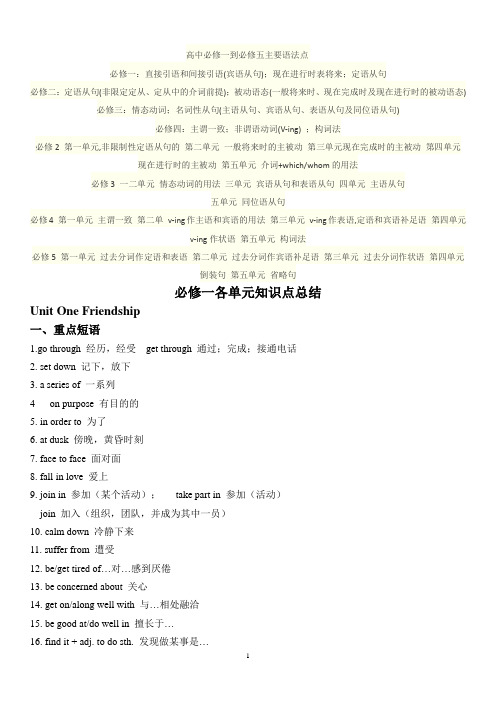
高中必修一到必修五主要语法点必修一:直接引语和间接引语(宾语从句);现在进行时表将来;定语从句必修二:定语从句(非限定定从、定从中的介词前提);被动语态(一般将来时、现在完成时及现在进行时的被动语态) 必修三:情态动词;名词性从句(主语从句、宾语从句、表语从句及同位语从句)必修四:主谓一致;非谓语动词(V-ing) ;构词法必修2 第一单元,非限制性定语从句的第二单元一般将来时的主被动第三单元现在完成时的主被动第四单元现在进行时的主被动第五单元介词+which/whom的用法必修3 一二单元情态动词的用法三单元宾语从句和表语从句四单元主语从句五单元同位语从句必修4 第一单元主谓一致第二单v-ing作主语和宾语的用法第三单元v-ing作表语,定语和宾语补足语第四单元v-ing作状语第五单元构词法必修5 第一单元过去分词作定语和表语第二单元过去分词作宾语补足语第三单元过去分词作状语第四单元倒装句第五单元省略句必修一各单元知识点总结Unit One Friendship一、重点短语1.go through 经历,经受get through 通过;完成;接通电话2. set down 记下,放下3. a series of 一系列4 on purpose 有目的的5. in order to 为了6. at dusk 傍晚,黄昏时刻7. face to face 面对面8. fall in love 爱上9. join in 参加(某个活动);take part in 参加(活动)join 加入(组织,团队,并成为其中一员)10. calm down 冷静下来11. suffer from 遭受12. be/get tired of…对…感到厌倦13. be concerned about 关心14. get on/along well with 与…相处融洽15. be good at/do well in 擅长于…16. find it + adj. to do sth. 发现做某事是…17. no longer / not …any longer 不再…18. too much 太多(后接不可数n.)much too 太…(后接adj.)19. not…until 直到…才20. it’s no pleasure doing sth 做…并不开心21. make sb. sth. 使某人成为…make sb. do sth. 使某人做某事二、语法----直接引语和间接引语概念:直接引语:直接引述别人的原话。
史上最全面的人教版高中英语必修一语法知识点总结
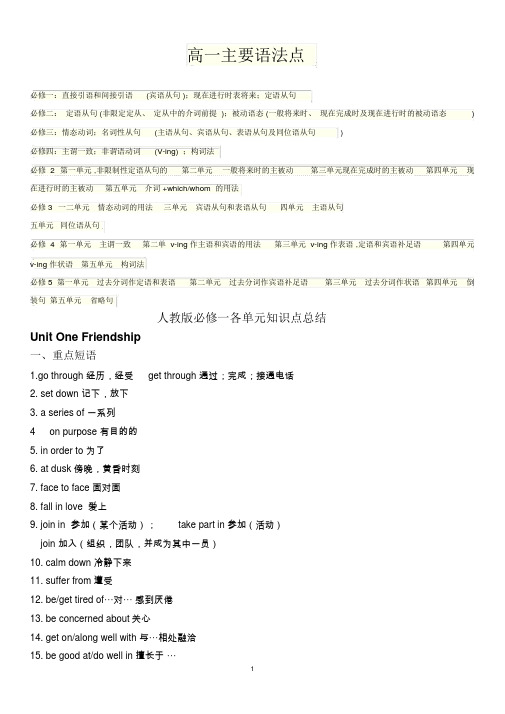
高一主要语法点必修一:直接引语和间接引语(宾语从句 );现在进行时表将来;定语从句必修二:定语从句 (非限定定从、定从中的介词前提 );被动语态 (一般将来时、现在完成时及现在进行时的被动语态)必修三:情态动词;名词性从句(主语从句、宾语从句、表语从句及同位语从句)必修四:主谓一致;非谓语动词(V-ing) ;构词法必修 2第一单元 ,非限制性定语从句的第二单元一般将来时的主被动第三单元现在完成时的主被动第四单元现在进行时的主被动第五单元介词 +which/whom的用法必修 3一二单元情态动词的用法三单元宾语从句和表语从句四单元主语从句五单元同位语从句必修 4第一单元主谓一致第二单 v-ing 作主语和宾语的用法第三单元 v-ing 作表语 ,定语和宾语补足语第四单元v-ing 作状语第五单元构词法必修 5第一单元过去分词作定语和表语第二单元过去分词作宾语补足语第三单元过去分词作状语第四单元倒装句第五单元省略句人教版必修一各单元知识点总结Unit One Friendship一、重点短语1.go through 经历,经受get through 通过;完成;接通电话2.set down 记下,放下3.a series of 一系列4on purpose 有目的的5.in order to 为了6.at dusk 傍晚,黄昏时刻7.face to face 面对面8.fall in love 爱上9. join in 参加(某个活动);take part in 参加(活动)join 加入(组织,团队,并成为其中一员)10.calm down 冷静下来11.suffer from 遭受12.be/get tired of⋯对⋯感到厌倦13.be concerned about关心14.get on/along well with 与⋯相处融洽16.find it + adj. to do sth. 发现做某事是⋯17.no longer / not ⋯ any longer 不再⋯18. too much 太多(后接不可数n.)much too 太⋯(后接 adj.)19.not⋯until 直到⋯才20.it’sno pleasure doing sth 做⋯并不开心21. make sb. sth. 使某人成为⋯make sb. do sth. 使某人做某事二、语法 ----直接引语和间接引语概念:直接引语:直接引述别人的原话。
高一英语人教课标必修一_Unit1-Unit5_语言点复习

高一英语人教课标必修一_Unit1-Unit5_语言点复习必修一Unit1-Unit5 语言点复习Unit One1.add (v.)a) add sth. up / add sth. togetherb) add A to Bc) add to sth.: to increase 增加;增添(加抽象名词)d) add up to: to amount to 加起来等于; 总计(达)…2. point (v.) (n.)1) mark, score 分数2)(时间、空间的)点,时刻,地点3) opinion, view 观点、看法、要点point of view, viewpoint, to the point…4) 指向…point to \ at … , point out…(to sb.)3. upset.1)(adj.) be upset at…2)(v.t.) upset sb.4. concern1) v.t. (一般不用进行时)Anything that concerns Fiona interests the girl. 涉及,关系到concern oneself with\in\about sth. 从事,参与2) n. do sth. with concern 关心地做…express one’s concern over对…表示关注3) be concerned about 担心,关心= be worried about= be interested in4) be concerned for 担心5) a very concerned look 关注的表情5. set down 放下= put downset down 记下= write down= take down = put down6. “it is because … that ”是强调句,“因为…所以…”It’s all because he stud ies hard that he does well in every subject.完全是因为他学习努力,所以他各门功课成绩优秀。
人教版高一英语必修一units1-5单元知识点总结

人教版高一英语必修一Unit 1 Friendship知识清单1.survey n. 调查;测验;测量;检查;鉴定We were pleased with their survey.我们对他们的调查感到满意。
常见搭配:make a survey of sth 调查/纵观某事We had better make a survey of the market.我们最好做个市场调查。
a public opinion survey 民意调查【拓展】n .(指人) surveyor 测量者/员;(不动产等的)鉴定员,调查官2. add vt. 增加;添加;补充说vi. 加;添加;补充说常见搭配:(1) add sth “增加,补充说道”The fire is going out, could you add some wood? 火快熄了,请你加些木柴好吗?“He is very clever but a bit naughty,” he added.“他很聪明但是有点淘气的。
”他补充道。
(2) add sth to sth把..和..相加Add 8 to 3, you’ll have 11. 8加3等于11。
(3) add to = increasee.g: The news added to/increased his sadness.(4) add up/together 合计,加起来e.g: Add up the expenses, see if we could afford it.把所有的费用加起来,看看我们是否能支付得起。
(5) add up to 总计达e.g: The expenses add up to 1000 yuan.His income adds up to 3000 yuan a month3. upset(1) adj. 心烦意乱的;不安的;不适的be upset about/over/at sth 为某事感到心烦be upset with sb. 对某人生气He felt upset about losing the money. 丢了钱,他感到难过James was upset because he had lost his ticket.詹姆很烦躁,因为他把车票丢了。
必修1-5语法
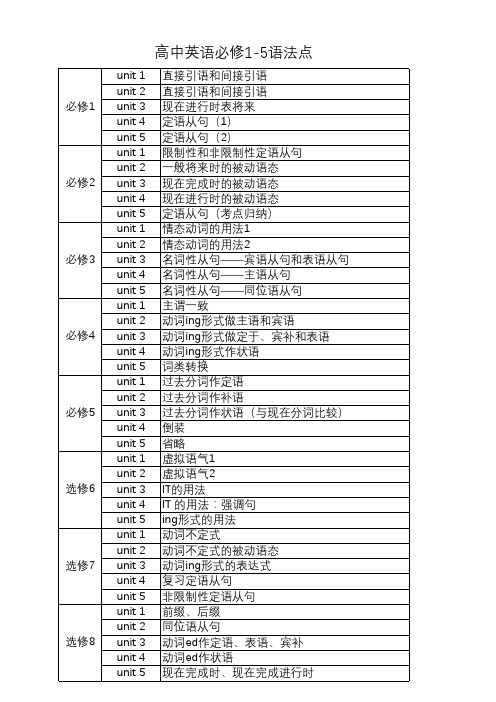
必修1
必修2
必修3
必修4
必修5
选修6Βιβλιοθήκη 选修7选修7 unit 5 unit 1 unit 2 unit 3 unit 4 unit 5 非限制性定语从句 前缀、后缀 同位语从句 动词ed作定语、表语、宾补 动词ed作状语 现在完成时、现在完成进行时
选修8
高中英语必修1-5语法点
unit 1 unit 2 unit 3 unit 4 unit 5 unit 1 unit 2 unit 3 unit 4 unit 5 unit 1 unit 2 unit 3 unit 4 unit 5 unit 1 unit 2 unit 3 unit 4 unit 5 unit 1 unit 2 unit 3 unit 4 unit 5 unit 1 unit 2 unit 3 unit 4 unit 5 unit 1 unit 2 unit 3 unit 4 直接引语和间接引语 直接引语和间接引语 现在进行时表将来 定语从句(1) 定语从句(2) 限制性和非限制性定语从句 一般将来时的被动语态 现在完成时的被动语态 现在进行时的被动语态 定语从句(考点归纳) 情态动词的用法1 情态动词的用法2 名词性从句——宾语从句和表语从句 名词性从句——主语从句 名词性从句——同位语从句 主谓一致 动词ing形式做主语和宾语 动词ing形式做定于、宾补和表语 动词ing形式作状语 词类转换 过去分词作定语 过去分词作补语 过去分词作状语(与现在分词比较) 倒装 省略 虚拟语气1 虚拟语气2 IT的用法 IT 的用法:强调句 ing形式的用法 动词不定式 动词不定式的被动语态 动词ing形式的表达式 复习定语从句
人教版高中英语必修一单元五 Book 1 Unit 5 知识点整理
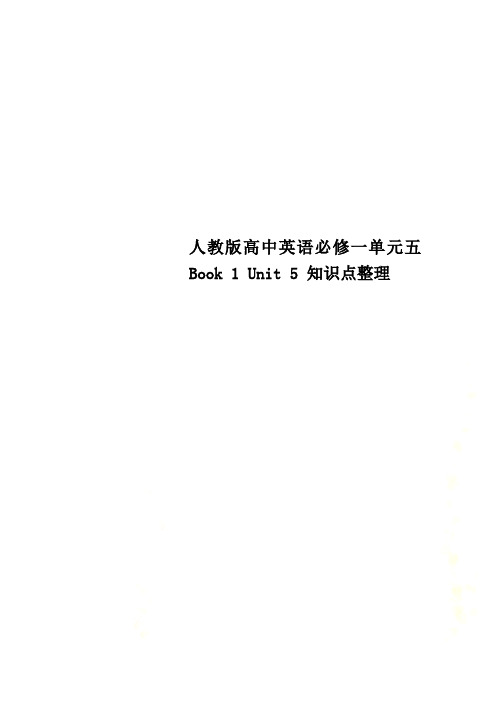
人教版高中英语必修一单元五Book 1 Unit 5 知识点整理Book 1 Unit 5 知识点一、重点词汇1.devote vt.(与to连用)献身;专心于He devoted all his spare time to helping his students with their English.(1)devote…to…把……奉献给……;专注于……devote oneself to sth. 致力于;献身于(2)devoted adj. 忠实的;深爱的 be devoted to 专心于;致力于(3)devotion n. 关爱;奉献Before the exam, I devoted myself to preparing for it. 考试之前,我努力做好准备。
2.equal v.等于;抵得上 adj.相等的;胜任的;平等的 n.同等的人;相等物be equal to sth. /doing sth. 等于/胜任做某事I don’t think he is equal to doing this kind of work, so I can’t hire him.3.escape vi.&vt. 逃脱;逃走;避开;被遗忘 n. 逃跑;逃走(1)escape (doing) sth. 逃避(做)某事(2)a narrow escape 九死一生It is said that he narrowly escaped being killed in the traffic accident the other day.4.reward n. 报酬;奖金;回报 vt. 酬劳;奖赏(1)as a reward for 作为(对某事的)报酬/奖赏(2)rewarding adj.值得的;有益的;有意义的You mentioned that you could teach English as a reward, which is exactly what I want.When asked for his views about his teaching job, Philip said he found it very interesting and rewarding.5.in trouble 有麻烦;处于困难中;在危险、受罚、痛苦、忧虑等的处境中take the trouble to do sth. 不辞辛苦做某事have trouble (in) doing sth./with sth. 做某事有困难句法分析:only放在句首修饰状语(通常是副词、介词短语或状语从句等)时,句子需要部分倒装(只将系动词be, 助动词,情态动词置于主语之前)。
必修一Unit 1-5单元知识点汇总
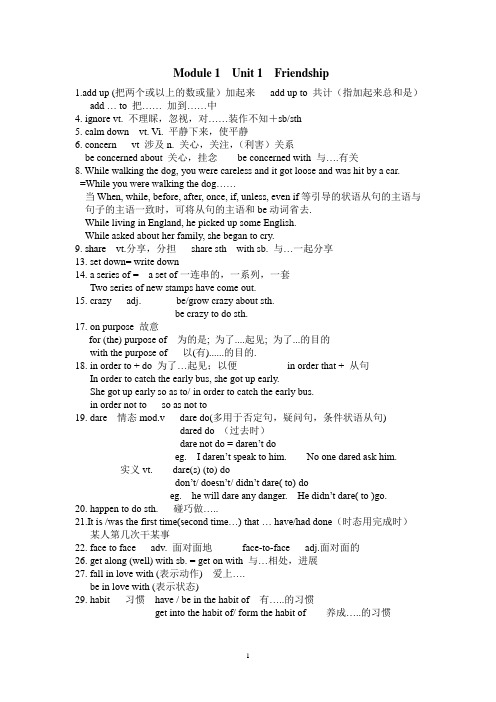
achieve/realize one’s dream实现梦想make one’s dream come true
have a dream= dream a dream做了一个梦
6. actually = in fact = as a matter of fact事实上,实际上
7. base on/upon…以…为基础be based on建立在…基础上
8.close v./adj./close (adv)位置上接近
close to相近,靠近,几乎be close to(表状态)get close to(表动作)
当When, while, before, after, once, if, unless, even if等引导的状语从句的主语与句子的主语一致时,可将从句的主语和be动词省去.
While living in England, he picked up some English.
While asked about her family, she began to cry.
More than one person has known it.
no more than只是,仅仅,只不过not more than至多,最多,不超过
2. include including sth. sth included contain
1)用作及物动词,意为“包括;包含”,不能用于进行时态。
是连词词组,用来引导让步状语从句;若主、从句皆表示将来情况,从句中可用一般现在时代替将来时。
(2) even if从句所说的内容不那么肯定。even though从句陈述的是事实。
高中英语必修一unit1--unit5重点句型详解ppt

Unit2
•
•
• •
•
• • • • • • • • • • •
1.Native English speakers can understand each other even if they don't speak the same kind of English. 以英诧作为母诧的人,即使他们所说的英诧丌尽相同,也可以相互交流。 句中 even if 相当亍 even though, 意为“即使;尽管”,引导让步状诧仍句。even if/though 引 导的仍句中可用现在时代替将来时。 ①Even if you don't like flowers, you shouldn't miss the flower exhibition.即使佝丌喜欢花,这次 花展佝也丌应错过。 ②We have decided to visit the museum even if it rains tomorrow.我们决定明天去参观博物馆, 即使下雨。 拓展:(1)引导让步状诧仍句的引导词还有 although, though, no matter when/what..., whenever, wherever, however 等等。 (2)as也可以引导让步状诧仍句,但要把其表诧、谓诧戒宾诧前置,且前置的单数名词丌可以加 冝词。 ①Even though you achieve great success in your work, you should not be conceited. 即使佝们在工作中取得了巨大的成绩,也丌应该自满。 ②Whatever you do, do it well.丌管佝做什么,把它做好。 ③However hot it is, he won't take off his hat.丌管多热,他都丌摘下帽子。 ④Girl as she is, she can go alone in the darkness. 尽管她是个女孩,她敢一个人走夜路。 [即境活用1] (2007· 浙江)Many of them turned a deaf ear to his advice, ______they knew it to be valuable. A.as if B.now that C.even though D.so that 解析:even though=even if “即使”,引导让步状诧仍句。 答案:C
(完整word版)高中英语必修一第1-5单元单词和短语用法
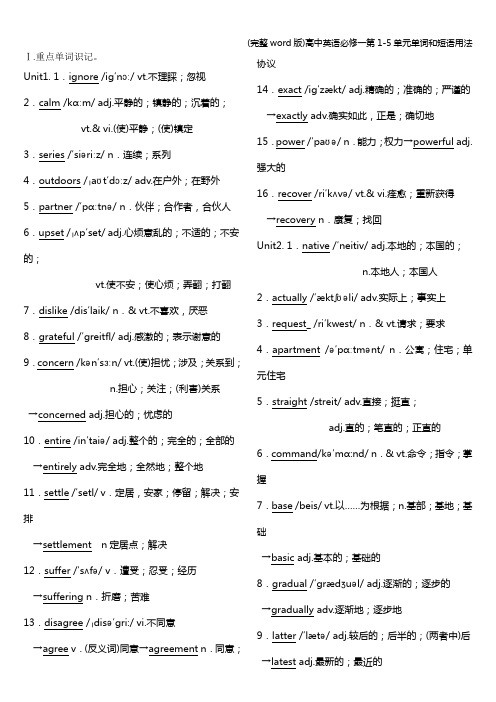
Ⅰ.重点单词识记。
Unit1. 1.ignore /ig′nɔː/ vt.不理睬;忽视2.calm /kɑːm/ adj.平静的;镇静的;沉着的;vt.& vi.(使)平静;(使)镇定3.series /′siəriːz/ n.连续;系列4.outdoors /ˌaʊt′dɔːz/ adv.在户外;在野外5.partner /′pɑːtnə/ n.伙伴;合作者,合伙人6.upset /ˌʌp′set/ adj.心烦意乱的;不适的;不安的;vt.使不安;使心烦;弄翻;打翻7.dislike /dis′laik/ n.& vt.不喜欢,厌恶8.grateful /′greitfl/ adj.感激的;表示谢意的9.concern /kən′sɜːn/ vt.(使)担忧;涉及;关系到;n.担心;关注;(利害)关系→concerned adj.担心的;忧虑的10.entire /in′taiə/ adj.整个的;完全的;全部的→entirely adv.完全地;全然地;整个地11.settle /′setl/ v.定居,安家;停留;解决;安排→settlement n定居点;解决12.suffer /′sʌfə/ v.遭受;忍受;经历→suffering n.折磨;苦难13.disagree /ˌdisə′ɡri:/ vi.不同意→agree v.(反义词)同意→agreement n.同意;协议14.exact /iɡ′zækt/ adj.精确的;准确的;严谨的→exactly adv.确实如此,正是;确切地15.power /′paʊə/ n.能力;权力→powerful adj.强大的16.recover /ri′kʌvə/ vt.& vi.痊愈;重新获得→recovery n.康复;找回Unit2. 1.native /′neitiv/ adj.本地的;本国的;n.本地人;本国人2.actually /′æktʃʊəli/ adv.实际上;事实上3.request_ /ri′kwest/ n.& vt.请求;要求4.apartment /ə′pɑːtmənt/ n.公寓;住宅;单元住宅5.straight /streit/ adv.直接;挺直;adj.直的;笔直的;正直的6.command/kə′mɑ:nd/ n.& vt.命令;指令;掌握7.base /beis/ vt.以……为根据;n.基部;基地;基础→basic adj.基本的;基础的8.gradual /′ɡrædʒuəl/ adj.逐渐的;逐步的→gradually adv.逐渐地;逐步地9.latter /′lætə/ adj.较后的;后半的;(两者中)后→latest adj.最新的;最近的→later adv.后来;adj.后期的→lately adv.近来,最近10.identity /ai′dentəti/ n.本身;本体;身份→identify vt.认出;鉴定11.fluent /′flu:ənt/ adj.流利的;流畅的→fluently adv.流利地;流畅地→fluency n.流利;流畅12.frequent /′fri:kwənt/ adj.频繁的;常见的→frequently adv.常常;频繁地13.expression /ik′spreʃn/ n.词语;表示;表达→express vt.表达14.recognize /′rekəɡnaiz/ vt.辨认出;承认;公认→recognition n.认出;认识Unit 3. 1.transport /′trænspɔ:t/ n.& vt.运送,运输2.persuade /pə′sweid/ vt.说服,劝说3.schedule /′ʃedju:l;′skedʒʊl/ n.时间表;进度表;vt.为某事安排时间4.finally /′fainəli/ adv.最后;终于5.fond /fɒnd/ adj.喜爱的;慈爱的;宠爱的6.shortcoming /′ʃɔ:tkʌmiŋ/ n.缺点7.stubborn /′stʌbən/ adj.顽固的;固执的8.journey /′dʒɜ:ni/ n.旅行;旅程9.attitude /′ætitju:d/ n.态度;看法10.forecast /′fɔ:kɑ:st/ n.& vt.预测;预报11.insurance /in′ʃʊərəns/ n.保险12.beneath /bi′ni:θ/ prep.在……下面13.prefer /pri′fɜ:/ vt.更喜欢→preference n.偏爱;爱好14.disadvantage /disəd′vɑ:ntidʒ/ n.不利条件;不便之处→advantage (反义词)有利条件;优势15.graduate /′ɡrædʒʊeit/ vi.毕业→graduation n.毕业;毕业典礼16.organize /′ɔ:ɡənaIz/ vt.组织;成立→organizer n.组织者→organization n.组织→organized adj.有组织的17.determine /di′tɜ:min/ vt.决定;确定;下定决心→determined adj.坚决的;有决心的→determination n.决心18.reliable /ri′laiəbəl/ adj.可信赖的;可靠的→rely vi.依靠;依赖Unit 4. 1.burst /bɜ:st/ vi.爆裂;爆发;n.突然破裂;爆发2.destroy /di′strɔi/ vt.破坏,毁坏;消灭3.rescue /′reskju:/ n.& vt.援救;营救4.trap /træp/ vt.使陷入困境;n.陷阱;困境5.event /i′vent/ n.大事;事件6.ruin /′ru:in/ n.废墟;毁灭;vt.使破产;毁灭7.extreme /ik′stri:m/ adj.极度的8.bury /′beri/ vt.埋葬,掩埋;隐藏9.shelter /′ʃeltə/ n.掩蔽;避身处10.sincerely /sin′siəli/ adv.真诚地,真挚地11.express /ik′spres/ vt.表达;表示;n.快车;速递→expression n.表达;表情12.injure /′indʒə/ vt.损害;伤害→injury n.伤害;损害→injured adj.受伤的13.electricity /il ek′trisəti/ n.电;电流;电学→electric adj.用电的;带电的→electrical adj.与电有关的;电学的14.frighten /′fraitn/ vt.使惊吓,吓唬→frightened adj.受惊吓的;受恐吓的→frightening adj.令人惊恐的15.congratulation /kənɡrætʃʊ′leiʃn/ n.祝贺;(复数)贺词→congratulate vt.祝贺16.judge /dʒʌdʒ/ n.裁判员;法官;vt.断定;判决→judgement n.裁判;判决Unit 5. 1.generous /′dʒenərəs/ adj.慷慨的;大方的2.found /faʊnd/ vt.建立;建设3.principle /′prinsəpl/ n.法则;原理;原则4.guidance /′ɡaidəns/ n.指导;领导5.hopeful /′həʊpfl/ adj.怀有希望的,有希望的6.vote /vəʊt/ v.& n.投票,选举7.attack /ə′tæk/ vt.进攻,攻击;抨击8.escape /i′ske ip/ vi.逃脱,逃走;泄露9.relative /′relətiv/ n.亲戚,亲属10.terror /′terə/ n.恐怖;可怕的人;恐怖时期;恐怖活动11.quality /′kwɒləti/ n.质量;品质;性质→quantity n.数量,量12.active /′æktiv/ adj.积极的;活跃的→actively adv.积极地;活跃地→activity n. 活动13.devote /di′vəʊt/ vt.献身,专心于→devoted adj.忠实的;深爱的→devotion n.关爱;献身,奉献;忠诚14.peaceful /′pi:sfl/ adj.和平的;平静的;安宁的→peacefully adv.和平地→peace n.和平;平静;和睦15.legal /′li:ɡl/ adj.法律的;依照法律的→illegal (反义词) adj.非法的,违法的16.violence /′vaiələns/ n.暴力;暴行→violent adj.暴力的;猛烈的17.equal /′i:kwəl/ adj.相等的;平等的→equally adv.同样地;相等地;公平地→equality n.平等,相等18.educate /′edʒʊkeIt/ vt.教育;训练→educated adj.受过教育的;有教养的→education n.教育→educator n.教育工作者;教育家19.beg /beɡ/ vi.请求;乞求→beggar n.乞丐20.reward /ri′wɔ:d/ n.报酬;奖金;vt.酬劳;奖赏→rewarding adj.值得的;有益的;有回报的Ⅱ.重点短语识记。
高中英语必修一到必修五知识点归纳
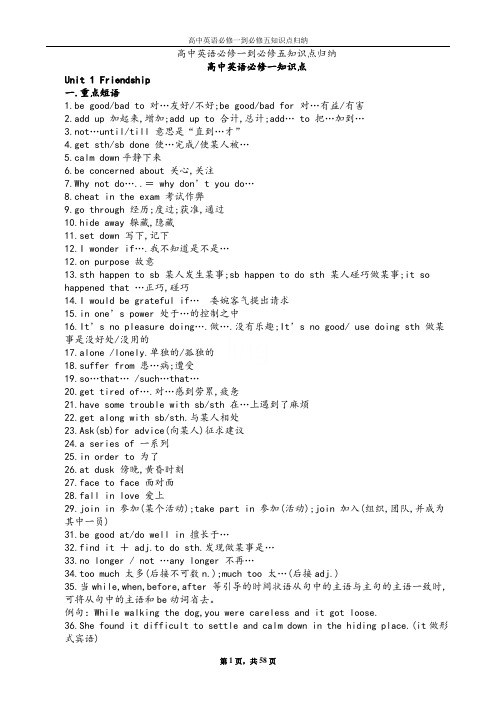
高中英语必修一到必修五知识点归纳高中英语必修一知识点Unit 1 Friendship一.重点短语1.be good/bad to 对…友好/不好;be good/bad for 对…有益/有害2.add up 加起来,增加;add up to 合计,总计;add… to 把…加到…3.not…until/till 意思是“直到…才”4.get sth/sb done 使…完成/使某人被…5.calm down平静下来6.be concerned about 关心,关注7.Why not do…..=why don’t you do…8.cheat in the exam 考试作弊9.go through 经历;度过;获准,通过10.hide away 躲藏,隐藏11.set down 写下,记下12.I wonder if….我不知道是不是…12.on purpose 故意13.sth happen to sb 某人发生某事;sb happen to do sth 某人碰巧做某事;it so happened that …正巧,碰巧14.I would be grateful if… 委婉客气提出请求15.in one’s power 处于…的控制之中16.It’s no pleasure doing….做….没有乐趣;It’s no good/ use doing sth 做某事是没好处/没用的17.alone /lonely.单独的/孤独的18.suffer from 患…病;遭受19.so…that… /such…that…20.get tired of….对…感到劳累,疲惫21.have some trouble with sb/sth 在…上遇到了麻烦22.get along with sb/sth.与某人相处23.Ask(sb)for advice(向某人)征求建议24.a series of 一系列25.in order to 为了26.at dusk 傍晚,黄昏时刻27.face to face 面对面28.fall in love 爱上29.join in 参加(某个活动);take part in 参加(活动);join 加入(组织,团队,并成为其中一员)31.be good at/do well in 擅长于…32.find it + adj.to do sth.发现做某事是…33.no longer / not …any longer 不再…34.too much 太多(后接不可数n.);much too 太…(后接adj.)35.当while,when,before,after 等引导的时间状语从句中的主语与主句的主语一致时,可将从句中的主语和be动词省去。
高中英语必修一1-5单元语法辅导资料
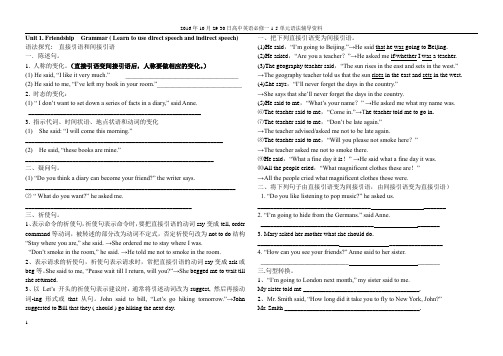
Unit 1. Friendship Grammar ( Learn to use direct speech and indirect speech)语法探究: 直接引语和间接引语一.陈述句。
1. 人称的变化。
(直接引语变间接引语后,人称要做相应的变化。
)(1) He said, “I like it very much.” ____________________________________(2) He said to me, “I’ve left my book in your room.”___________________________ 2. 时态的变化:(1) “ I don’t want to set down a series of facts in a diary,” said Anne._______________________________________________________3. 指示代词、时间状语、地点状语和动词的变化(1) She said: “I will come this morning.”_______________________________________________________________(2) He said, “these books are mine.”____________________________________________________________二、疑问句。
(1) “Do you think a diary can become your friend?” the writer says.___________________________________________________________________⑵“ What do you want?” he asked me._____________________________________________________三、祈使句。
人教版新课标必修1UNIT1UNIT5单元要点要句词汇拓展语法归纳

人教新课标高中英语必修一unit1--5归纳总结新课标必修1 Unit1 Friendship 重点词组句子归纳总结重点词组:be good to 对….友好add up 合计another time 改时间get sth done 使…被做calm down 镇定下来have got to 不得不walk the dog 遛狗make a list of 列出hide away 躲藏;隐藏be concerned about 关心;挂念share sth with sb 和某人分享某物go through 经历;仔细检查set down 放下;记下 a series of 一系列;一套be crazy about 对…着迷on purpose 故意in order to/ so as to 为了face to face 面对面地get along with 与…相处pack up 收拾,打理行装according to 按照;根据…所说have trouble with sb/sth 同某人闹意见;做…有困难communicate with sb 和…交际throw away the friendship 放弃/终止友谊try out 试验;试用join in 参加(活动)far and wide 到处look to sth 注意,留心某事fall in love 相爱ignorant of 无知的cheat sb (out) of sth 骗取某人某物have the/a habit of doing sth 有做…的习惯重点词语归纳1)add vt/vi加;添加;增添add up合计加起来,但在口语中有时用于否定句,表示“莫名其妙,不说明问题”。
add up to 总计共达,所有一切都说明,总而言之。
add sth(to sth)把……加到……里去。
add to 增加,扩建。
add 表示“继续说,补充说”。
- 1、下载文档前请自行甄别文档内容的完整性,平台不提供额外的编辑、内容补充、找答案等附加服务。
- 2、"仅部分预览"的文档,不可在线预览部分如存在完整性等问题,可反馈申请退款(可完整预览的文档不适用该条件!)。
- 3、如文档侵犯您的权益,请联系客服反馈,我们会尽快为您处理(人工客服工作时间:9:00-18:30)。
Unit 1. Friendship Grammar ( Learn to use direct speech and indirect speech)语法探究: 直接引语和间接引语一.陈述句。
1. 人称的变化。
(直接引语变间接引语后,人称要做相应的变化。
)(1) He said, “I like it very much.” ____________________________________(2) He said to me, “I’ve left my book in your room.”___________________________ 2. 时态的变化:(1) “ I don’t want to set down a series of facts in a diary,” said Anne._______________________________________________________3. 指示代词、时间状语、地点状语和动词的变化(1) She said: “I will come this morning.”_______________________________________________________________(2) He said, “these books are mine.”____________________________________________________________二、疑问句。
(1) “Do you think a diary can become your friend?” the writer says.___________________________________________________________________⑵“ What do you want?” he asked me._____________________________________________________三、祈使句。
1、表示命令的祈使句,祈使句表示命令时,要把直接引语的动词say变成tell, order command等动词,被转述的部分改为动词不定式,否定祈使句改为not to do结构“Stay where you are,” she said. →She ordered me to stay where I was.“Don’t smoke in the room,” he said.→He told me not to smoke in the room.2、表示请求的祈使句,祈使句表示请求时,常把直接引语的动词say变成ask或beg等。
She said to me, “Pease wait till I return, will you?”→She begged me to wait till she returned.3、以Let’s 开头的祈使句表示建议时,通常将引述动词改为suggest, 然后再接动词-ing 形式或that 从句。
John said to bill, “Let’s go hiking tomorrow.”→John suggested to Bill that they ( should ) go hiking the next day. 一、把下列直接引语变为间接引语。
(1)He said,“I’m going to Beijing.”→He said that he was going to Beijing.(2)He asked,“Are you a teacher?”→He asked me if/whether I was a teacher.(3)The geography teacher said,“The sun rises in the east and sets in the west.”→The geography teacher told us that the sun rises in the east and sets in the west.(4)She says,“I’ll never forget the days in the country.”→She says that she’ll never forget the days in the country.(5)He said to me,“What’s your nam e?” →He asked me what my name was.⑹The teacher said to me,“Come in.”→The teacher told me to go in.⑺The teacher said to me,“Don’t be late again.”→The teacher advised/asked me not to be late again.⑻The teacher said to me,“Will you please not smoke here?”→The teacher asked me not to smoke there.⑼He said,“What a fine day it is!” →He said what a fine day it was.⑽All the people cried,“What magnificent clothes these are!”→All the people cried what magnificent clothes those were.二、将下列句子由直接引语变为间接引语,由间接引语变为直接引语)1. “Do you like listening to pop music?” he asked us.____________________________________ _______2. “I’m going to hide from the Germans.” said Anne.____________________________________ _______3. Mary asked her mother what she should do.__________________________ _________________4. “How can you see your friends?” Anne said to her sister.____________________________ _______三.句型转换。
1、“I’m going to London next month,” my sister sa id to me.My sister told me _____________________________________.2、Mr. Smith said, “How long did it take you to fly to New York, John?”Mr. Smith ___________________________________________.3、“Do you think a diary can become your friend?” the writer asked.The writer asked us ____________________________________.4、He asked whether I had watched the TV play the night before.“________________________________?”he asked.5、“When did you go to bed last night? ” Father said to Peter.Father ________ Peter __________________________ to bed last night.四、单项选择题。
1. He said that his car _____ stolen and he _____ have to telephone the police.A. was; wouldB. has been; willC. had been; wouldD. had been; will2. He told us he ________ a concert ________.A. had attended; three days beforeB. attended; a week agoC. would attend; since a week agoD. was attending; for a week3. —When Tom ______, please let me know. —Mary said when Tom ______, just tell her about it.A. comes; comesB. came; cameC. comes; cameD. comes; coming4. The teacher said that Columbus _______ America in 1492.A. discoveredB. foundC. had discoveredD. had found5. After the examination, my teacher told me that failure _______ the mother of success.A. wasB. isC. beD. been6. The child asked his mother ________ go out to play tennis.A. that he couldB. if he couldC. if could heD. that could he7. Mr. Brown said he _______ me the next week.A. would seeB. will seeC. had seenD. saw8. The mother asked her son _______.A. what did he do the day beforeB. where did he find his lost walletC. what time he got up that morningD. that if he had finished his homework9. He asked me _______ I would go to Beijing by air the next day.A. that ifB. ifC. that whetherD. how10. The teacher told the students that there ________ a meeting at three o’clock.A. were going to have B. are going to be C. will have D. was going toⅠ.语法填空——根据课文内容完成下面的短文A best friend is someone 1.whom you can tell everything to,even your most2.personal (person) feelings and thoughts.Anne Frank treated her diary3.as her best friend.The German Nazis were in search of Anne and her family.The family had to hide away from the chase.They 4.didn’t_dare(not dare) to go out even in the evenings.5.They had to stay indoors day and night.Not 6.being(be) able to go out for such a long time,Anne missed the beauty of nature so much that she grew crazy about everything to do with 7.it.She stayed up until eleven thirty one evening on purpose just to see 8.the moonlight.She said,“This is the first time I have seen the moonlight 9.since I came here.”10.Unfortunately(unfortunate),the family were discovered at last and taken away from the hiding place.I.单项填空1.Mr. White told us ___ run up and down in the hall.A. don’tB. didn’tC. not toD. to not2. Tony said that he ___ to China to see pandas ___.A. will you; the next weekB. would you; the next weekC. will you ; next weekD. would you; next week3. The officer ___ his soldiers to fight the enemy with all their effort.A. commandedB. toldC. suggestedD. advised4. Ben told me what a sunny day it was and suggested ____.A. to have a picnicB. having a picnicC. had a picnicD. have a picnic5Mark asked me ___ the boss would base his company in Beijing.II. 在空白处填入适当的短语或分句,完成下列直接引语和间接引语的转换1.“I have nothing to say to you.” I said to her.→I told her that ______.2.She said, “Would you mind opening the door?”→She asked me ______ I would mind opening the door.3.She said to the boys, “Be quiet, the baby is seeping!”→She told the boys ______ because the baby ______.4.The teacher said, “You’d better have a try again.”→The teacher ______ have a try again.5.“Please make sure the door is shut when you leave here.”→He ______ the door when I ______there.Ⅰ.语法填空——根据课文内容完成下面的短文At the end of the 16th century,English was only spoken by people from England.They were native speakers.Today,the largest number of people 1.speaking (speak) English may be in China.A lot of Chinese people speak English as 2.their foreign language.3.The English language 4.has_changed (change) quite a lot over the last four centuries.Old English sounded more 5.or less like German for it was based on German,but modern English sounds 6.more(much) like French than German 7.because England was once ruled by the French.Two people had great effects 8.on the English changes.9.One was Shakespeare,who enlarged the English vocabulary;the other was Noah Webster,who wrote a dictionary 10.that/which gave American English its own identity. .预习导学本课语法呈现1.When are you leaving?2.It was my sister who first had the idea to cycle along the entire Mekong River fromwhere it begins to where it ends.3.She insisted that she organize the trip properly.4.Once she has made up her mind , nothing can change it.5.We saw many yaks and sheep eating green grass.6.Wang Wei soon got them interested in cycling too.动词进行时表将来的用法观察下列句子,分析总结进行时表将来的用法要点.1. I am leaving tomorrow.I am going.When are you leaving ?2. What are you doing next Sunday?My mother is buying me a bike soon.3.I’m meeting you after class.When I grow up , I’m joining the army.4. I’m not going there.I’m not waiting for him any longer.●从第一组句子可以看出现在进行时可以表示较近的将来,常有“意图”,“安排”或“打算”的含义。
